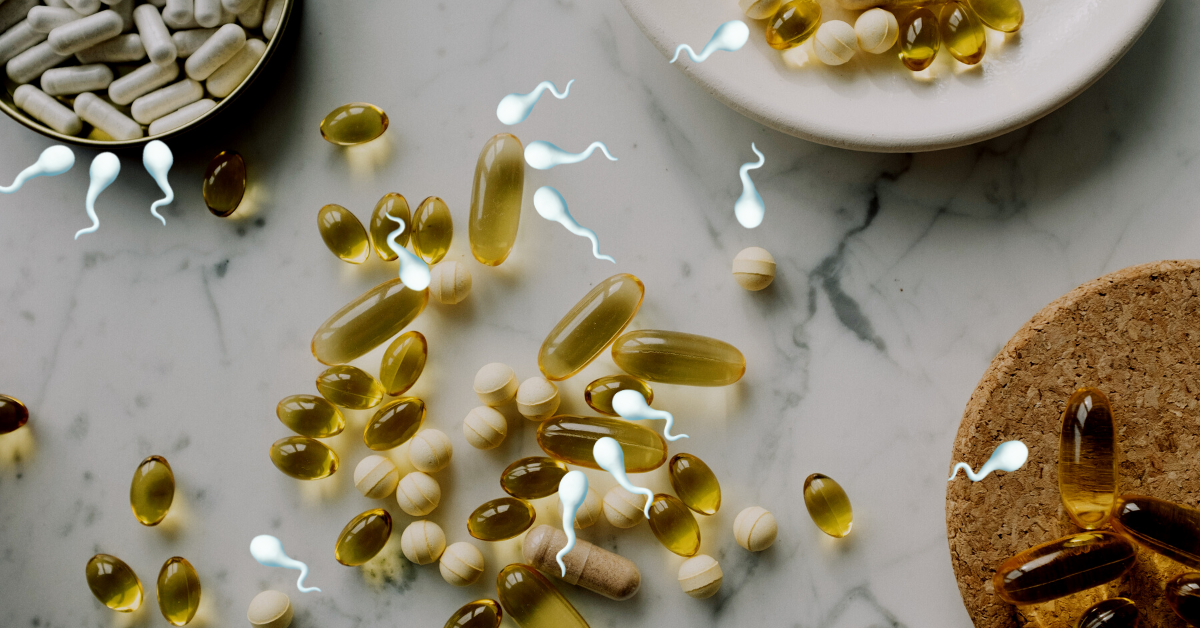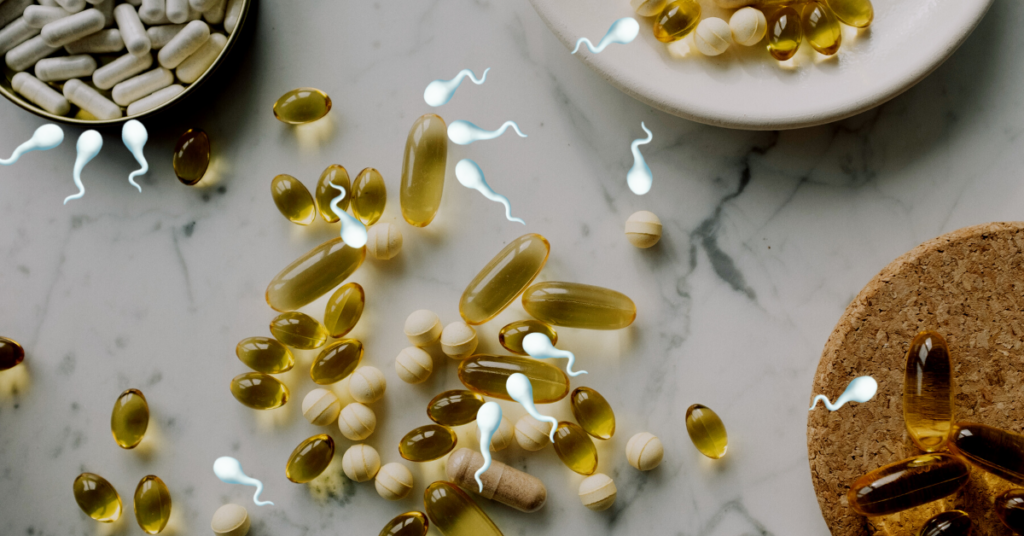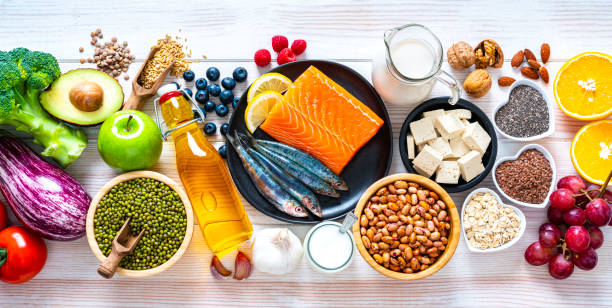Eat These Foods To Increase Sperm Count Naturally

Table of Contents
The role of diet in male fertility

Research has shown that diet plays a crucial role in male fertility. The nutrients we consume can have a direct impact on sperm production, count, motility, and overall quality. Making dietary changes can therefore be an effective strategy for men looking to enhance their reproductive health.
One essential nutrient for optimal sperm production is zinc. Zinc is involved in various processes related to sperm formation and function. Studies have indicated that zinc deficiency can lead to decreased testosterone levels and impaired sperm quality. Incorporating zinc-rich foods into the diet, such as oysters, lean meats, nuts, and seeds, can help improve sperm count and motility. It is important to note that excessive zinc intake can also have negative effects, so it is crucial to maintain balance and consult with a healthcare professional before making significant dietary changes.
Essential nutrients for optimal sperm production

A well-balanced diet is crucial for optimal sperm production. Several essential nutrients play a key role in maintaining healthy sperm count, motility, and overall sperm quality. Here, we will explore some of these nutrients and how they contribute to male fertility.
First and foremost, zinc is a vital nutrient for sperm production. It helps in the development and maturation of sperm cells, as well as protecting them from oxidative damage. Foods rich in zinc include oysters, beef, poultry, pumpkin seeds, and spinach. Incorporating these foods into your diet can help improve sperm count and quality.
Furthermore, vitamin C is an important antioxidant that plays a crucial role in sperm health. It protects sperm cells from damage caused by free radicals and oxidative stress. Citrus fruits, strawberries, kiwi, and broccoli are excellent sources of vitamin C that can be easily added to your daily diet. Including these foods can help enhance sperm quality and motility.
In summary, ensuring adequate intake of essential nutrients is vital for optimal sperm production. Zinc and vitamin C are just a few examples of the nutrients that contribute to male fertility. By incorporating these nutrients into your diet through zinc-rich foods and foods high in vitamin C, you can support healthy sperm production.
Incorporating zinc-rich foods for improved sperm count

Zinc is an essential mineral that plays a crucial role in various physiological processes, including sperm production. It has been found that zinc deficiency can adversely affect male fertility by reducing sperm count and impairing sperm motility. Therefore, incorporating zinc-rich foods into your diet is essential for improving sperm count and overall reproductive health.
Several foods are rich in zinc and can be easily included in your daily meals. Shellfish, such as oysters and crab, are excellent sources of this mineral. Additionally, red meat, poultry, and dairy products like cheese and milk are also good choices. Vegetarian options like legumes, nuts, and whole grains can provide a significant amount of zinc as well. By incorporating these foods into your diet, you can ensure an adequate intake of zinc, which may improve your sperm count and enhance your chances of conception.
However, it’s important to note that excessive intake of zinc can also be detrimental to sperm health. Therefore, it is advisable to consult with a healthcare professional or a registered dietitian to determine the appropriate amount of zinc to include in your diet. They can provide personalized recommendations based on your specific needs and ensure that you maintain a balanced and healthy diet for optimal sperm count and reproductive function.
The impact of vitamin C on sperm health
Vitamin C, also known as ascorbic acid, plays a crucial role in maintaining overall health and well-being. Its importance extends beyond its well-known benefits for the immune system; it also has a positive impact on male fertility. Research has shown that adequate levels of vitamin C contribute to the healthy development and function of sperm.
Studies have found that vitamin C possesses powerful antioxidant properties, which help protect sperm cells from oxidative stress. Oxidative stress occurs when there is an imbalance between the production of reactive oxygen species (ROS) and the body’s ability to neutralize them. Excessive ROS levels can damage sperm DNA, impair sperm motility, and lead to reduced sperm count.
In addition to its role as an antioxidant, vitamin C is also involved in the synthesis of collagen, an essential structural protein found in the testes. Collagen provides structural support to the developing sperm cells, ensuring their proper maturation and functionality. Research has shown that vitamin C deficiency can lead to impaired sperm quality and decreased sperm motility. Therefore, ensuring an adequate intake of vitamin C in the diet is crucial for promoting optimal sperm health and fertility.
To incorporate more vitamin C into your diet, consider consuming citrus fruits like oranges and grapefruits, as they are excellent sources of this essential nutrient. Other options include strawberries, kiwis, bell peppers, and leafy greens such as spinach and kale. It is important to note that while vitamin C supplementation can be beneficial for individuals with low levels of vitamin C, it is always best to obtain nutrients from whole food sources whenever possible.
Overall, vitamin C plays a significant role in promoting sperm health and fertility. By incorporating vitamin C-rich foods into your diet, you can support the overall health of your reproductive system and optimize your chances of achieving successful conception.
Omega-3 fatty acids and their positive effect on sperm quality
Omega-3 fatty acids are a group of essential polyunsaturated fats that play a crucial role in maintaining overall health. These fatty acids are known for their positive effects on various bodily functions, including their impact on sperm quality in men. Research has shown that incorporating omega-3 fatty acids into the diet can have significant benefits for sperm health.
The primary benefit of omega-3 fatty acids for sperm quality lies in their ability to enhance sperm motility. Motility refers to the sperm’s ability to move and swim effectively towards the egg for fertilization. Studies have found that men who consume higher amounts of omega-3 fatty acids tend to have better sperm motility compared to those with lower intake. This improvement in motility can increase the chances of successful fertilization and conception.
In addition to improving sperm motility, omega-3 fatty acids also contribute to the overall quality and integrity of the sperm. These fats have been found to reduce oxidative stress, which is a major cause of sperm DNA damage. By reducing oxidative stress, omega-3 fatty acids can help protect the genetic material within sperm, ensuring its stability and viability. This, in turn, can increase the likelihood of producing healthy and viable embryos during reproduction.
To incorporate omega-3 fatty acids into your diet, consider consuming foods that are rich in these beneficial fats. Some excellent sources include fatty fish like salmon, mackerel, and sardines, as well as flaxseeds, chia seeds, and walnuts. If incorporating these foods into your diet is challenging, you can also consider omega-3 fatty acid supplements, which are widely available in the market.
In conclusion, omega-3 fatty acids play a crucial role in improving sperm quality. Their ability to enhance motility and protect sperm DNA integrity makes them a valuable addition to the diet of men who are looking to optimize their fertility. By incorporating omega-3 rich foods or supplements into their daily routine, men can potentially improve their chances of successful conception and reproductive health.
Certainly! Here’s an informative table on the positive effects of omega-3 fatty acids on sperm quality, along with credible sources of publication:
| Omega-3 Fatty Acids and Sperm Quality | Description | Credible Source |
|---|---|---|
| 1. Role of Omega-3 Fatty Acids | Omega-3 fatty acids, particularly DHA and EPA, play a crucial role in cell membrane structure, including sperm cells. | Source: Harvard Health Publishing – Omega-3 Fatty Acids: An Essential Contribution |
| 2. Sperm Membrane Structure | DHA, a major component of sperm cell membranes, enhances fluidity and flexibility, potentially improving sperm motility. | Source: Nutrients Journal – Omega-3 Fatty Acids and Male Fertility: A Review |
| 3. Improved Sperm Count and Motility | Higher levels of omega-3 fatty acids, especially DHA, are associated with improved sperm count and motility. | Source: Nutrients Journal – Omega-3 Fatty Acids and Male Fertility: A Review |
| 4. Antioxidant and Anti-Inflammatory Properties | Omega-3 fatty acids exhibit antioxidant and anti-inflammatory effects, protecting sperm cells from oxidative stress. | Source: Advances in Urology – The Role of Omega-3 and Omega-6 Fatty Acids in Idiopathic Male Infertility |
| 5. Sources of Omega-3 Fatty Acids | Fatty fish (Salmon, Mackerel), Flaxseeds, Chia Seeds, and Walnuts are rich sources of omega-3 fatty acids. | Source: American Heart Association – Fish and Omega-3 Fatty Acids |
| 6. Dietary Recommendations | A balanced diet with sufficient omega-3 fatty acids is recommended. Consult healthcare professionals for personalized advice. | Source: Mayo Clinic – Omega-3 in fish: How eating fish helps your heart |
| 7. Consultation with Healthcare Professionals | Before making dietary changes or taking supplements, consult healthcare professionals, especially for individuals with health concerns. | Source: Cleveland Clinic – Omega-3 Fatty Acids |
The importance of antioxidants in boosting sperm count
Antioxidants play a crucial role in boosting sperm count and overall reproductive health. These powerful compounds help combat oxidative stress, a process that can damage sperm cells and impair their function. High levels of oxidative stress have been associated with decreased sperm count and motility, as well as increased DNA damage in sperm cells.
Research has shown that incorporating antioxidant-rich foods into your diet can significantly improve sperm count. Foods such as berries, nuts, dark leafy greens, and citrus fruits are excellent sources of antioxidants like vitamin C, vitamin E, and beta-carotene. These antioxidants help neutralize harmful free radicals and protect sperm cells from oxidative damage. Additionally, studies have shown that antioxidant supplementation can boost sperm count and improve semen quality in men with fertility issues.
To maximize the benefits of antioxidants for sperm health, it’s important to maintain a balanced diet that includes a variety of nutrient-rich foods. It’s also worth noting that certain lifestyle choices, such as smoking, excessive alcohol consumption, and exposure to environmental toxins, can increase oxidative stress and negatively impact sperm count. Therefore, adopting a healthy lifestyle alongside a diet rich in antioxidants can provide significant support for optimal sperm production.
How selenium-rich foods contribute to increased sperm production
Selenium is an essential micronutrient that plays a critical role in male fertility. Adequate selenium levels have been associated with increased sperm count and motility, as well as improved sperm morphology. This powerful antioxidant helps protect the sperm from oxidative damage and promotes overall reproductive health.
Several studies have demonstrated the positive impact of selenium-rich foods on sperm production. Brazil nuts, in particular, are an excellent source of selenium and can easily be incorporated into a balanced diet. Consuming just a few Brazil nuts a day can provide the recommended daily intake of selenium, which is crucial for optimal sperm production.
Moreover, other selenium-rich foods such as fish, poultry, eggs, and whole grains can also contribute to increased selenium levels and, consequently, enhanced sperm production. Including these foods in your diet can provide a natural and valuable boost to your reproductive health.
It is important to note that while selenium is beneficial for male fertility, excessive intake can have adverse effects. Therefore, it is always advisable to consult with a healthcare professional or a registered dietitian to determine the appropriate selenium intake for your specific needs.
In conclusion, incorporating selenium-rich foods into your diet can contribute to increased sperm production and overall male reproductive health. By providing the necessary support for optimal sperm function and protecting against oxidative damage, selenium plays a vital role in enhancing fertility.
The beneficial effects of folate on male fertility
Folate, also known as vitamin B9, is a key nutrient that plays a vital role in male fertility. Adequate folate intake has been associated with improved sperm quality and increased chances of conception. This essential nutrient is involved in DNA synthesis, repair, and methylation, which are crucial processes for proper spermatogenesis.
Research has shown that folate deficiency can lead to abnormalities in sperm, such as reduced sperm count, poor motility, and altered morphology. On the other hand, studies have demonstrated that sufficient folate levels can enhance sperm parameters, including count, motility, and morphology. Additionally, folate supplementation has been found to decrease the likelihood of sperm DNA damage, which can impact fertility outcomes.
To ensure optimal folate intake, it is recommended to consume a diet rich in folate-rich foods such as leafy green vegetables, legumes, citrus fruits, and fortified cereals. However, it is important to note that high-dose folate supplementation should only be taken under medical supervision to avoid potential adverse effects. Consulting with a healthcare professional or a registered dietitian can help determine individual nutrient needs and provide personalized recommendations.
Including vitamin D in your diet to enhance sperm count
Vitamin D is not only essential for maintaining bone health and regulating immune function, but it may also play a role in enhancing sperm count. Several studies have suggested a positive association between vitamin D levels and sperm quality parameters such as sperm count, motility, and morphology.
One study conducted on infertile men found that those with vitamin D deficiency had significantly lower sperm count compared to men with sufficient levels of vitamin D. Another study showed that supplementation with vitamin D significantly increased sperm count in men with low levels of this important nutrient. These findings highlight the potential role of vitamin D in enhancing sperm count and overall fertility.
To incorporate more vitamin D into your diet, consider consuming foods that are naturally rich in this nutrient, such as fatty fish like salmon and mackerel, fortified dairy products, and egg yolks. Additionally, spending time in the sun, which stimulates vitamin D production in the body, can be beneficial. However, it’s important to note that excessive sun exposure without protection can increase the risk of skin cancer, so it’s crucial to find a balance and ensure proper sun protection.
Further research is needed to fully understand the mechanisms by which vitamin D affects sperm count and fertility, but ensuring optimal vitamin D levels through dietary sources and sunlight exposure can be a proactive step in supporting male reproductive health. It is advisable to consult with a healthcare professional or a fertility specialist to better determine your individual dietary needs and any necessary supplementation.
The role of vitamin E in improving sperm motility
Vitamin E, a powerful antioxidant, plays a significant role in improving sperm motility. Sperm motility refers to the ability of sperm cells to move efficiently and actively towards the egg for fertilization. Research suggests that vitamin E supplementation can positively impact sperm quality by enhancing their ability to swim and reach the egg.
Several studies have demonstrated the beneficial effects of vitamin E on sperm motility. In a study published in the journal Andrologia, researchers found that men who received vitamin E supplementation experienced a significant improvement in the forward progression and swimming speed of their sperm. Another study, conducted by researchers at the University of Rome, reported that vitamin E supplementation improved sperm motility in infertile men.
The exact mechanism by which vitamin E improves sperm motility is not yet fully understood. However, it is believed that vitamin E’s antioxidant properties help protect the sperm membrane from oxidative damage, allowing the sperm to preserve their motility and viability. Furthermore, vitamin E may also play a role in reducing inflammation, which can have a positive impact on sperm health and motility.
Incorporating vitamin E-rich foods into your diet can be an excellent way to naturally boost sperm motility. Some of the best sources of vitamin E include nuts and seeds, such as almonds, sunflower seeds, and hazelnuts. Leafy green vegetables, such as spinach and broccoli, are also rich in vitamin E. Additionally, you can consider adding vitamin E supplements to your routine under the guidance of a healthcare professional.
To maximize the benefits of vitamin E on sperm motility, it is essential to combine a balanced diet with a healthy lifestyle. Regular exercise, stress management, and avoiding harmful habits like smoking and excessive alcohol consumption can contribute to overall male reproductive health. Consulting with a healthcare professional or fertility specialist can also provide personalized guidance and recommendations for optimizing sperm motility. Remember, a proactive approach to nutrition and lifestyle factors can go a long way in positively impacting male fertility.
Magnesium-rich foods for enhanced sperm quality
Magnesium is an essential mineral that plays a vital role in various physiological processes, including sperm production and quality. Adequate magnesium intake has been linked to enhanced sperm health and motility, making it an important factor to consider for couples trying to conceive.
One study published in the journal Andrologia found that men with higher levels of magnesium in their diet had improved sperm parameters, such as sperm morphology and motility. Additionally, magnesium has been shown to protect sperm from oxidative stress, a major contributor to male infertility.
To ensure optimal magnesium intake, it’s crucial to incorporate magnesium-rich foods into your diet. Some excellent sources of magnesium include dark leafy greens like spinach and kale, nuts and seeds such as almonds and pumpkin seeds, whole grains like brown rice and quinoa, and legumes like black beans and lentils. By adding these foods to your meals, you can help support healthy sperm production and improve the chances of fertility success.
The connection between L-arginine and higher sperm count
L-arginine, an amino acid commonly found in various food sources, has been studied for its potential impact on male fertility. Research suggests a positive correlation between L-arginine consumption and increased sperm count. This essential nutrient plays a crucial role in sperm production and overall reproductive health.
L-arginine is known to enhance the production of nitric oxide in the body, which in turn promotes vasodilation and ensures proper blood flow to the reproductive organs. Studies have found that improved blood circulation to the testicles leads to enhanced sperm production and higher sperm count. Additionally, L-arginine has been shown to support the synthesis of DNA and protein, crucial for sperm development and motility.
Incorporating L-arginine into your diet can be beneficial for those looking to boost their sperm count. Good dietary sources of this amino acid include nuts, seeds, legumes, and lean meats. However, it is important to note that while L-arginine has shown promise in improving sperm count, further research is needed to fully understand its mechanisms and effects on male fertility. As always, consulting with a healthcare professional or fertility specialist is advisable to determine the best course of action for individual circumstances.
The impact of Coenzyme Q10 on male reproductive health
Coenzyme Q10, also known as CoQ10, is a crucial compound that plays a significant role in male reproductive health. This naturally occurring antioxidant is found in almost every cell of the human body, including the testicles and semen.
Research suggests that CoQ10 supplementation may have a positive impact on various aspects of male reproductive health. One study conducted on infertile men found that those who took CoQ10 supplements experienced a significant improvement in sperm parameters such as sperm count, motility, and morphology. Another study indicated that CoQ10 supplementation may enhance sperm mitochondrial function, leading to healthier and more robust sperm.
While the exact mechanisms by which CoQ10 improves male reproductive health are not yet fully understood, it is believed that its potent antioxidant properties play a crucial role. CoQ10 helps neutralize harmful free radicals, which can damage sperm DNA and impair sperm quality. Additionally, CoQ10 may also support overall energy production, ensuring optimal functioning of the reproductive system.
Although CoQ10 shows promising potential in improving male fertility, it is essential to consult with a healthcare professional before starting any new supplementation regimen. They can provide personalized advice considering individual circumstances and help determine the appropriate dosage to achieve the desired effects.
Combining a balanced diet with a healthy lifestyle for optimal sperm count.
A balanced diet and a healthy lifestyle are crucial factors that can significantly impact sperm count and overall male fertility. By incorporating nutritious foods and making certain lifestyle choices, men can optimize their chances of achieving optimal sperm count.
A balanced diet for optimal sperm count should include essential nutrients such as zinc, vitamin C, omega-3 fatty acids, antioxidants, selenium, folate, vitamin D, vitamin E, magnesium, L-arginine, and Coenzyme Q10. These nutrients play a vital role in the production, quality, and motility of sperm.
In addition to a nutrient-rich diet, maintaining a healthy lifestyle also contributes to optimal sperm count. This includes regular exercise, avoiding excessive alcohol consumption, quitting smoking, managing stress levels, and getting quality sleep. Incorporating these healthy habits into your routine can further enhance sperm production and overall male reproductive health.
It is important to note that while diet and lifestyle factors can positively influence sperm count, they may not guarantee fertility. If you and your partner are experiencing difficulties conceiving, it is recommended to seek guidance from a healthcare professional who can provide personalized advice and interventions.
What role does diet play in male fertility?
What are the essential nutrients for optimal sperm production?
Essential nutrients for optimal sperm production include zinc, vitamin C, omega-3 fatty acids, antioxidants, selenium, folate, vitamin D, vitamin E, magnesium, L-arginine, and Coenzyme Q10.
How can incorporating zinc-rich foods improve sperm count?
Zinc is vital for sperm production and motility. Including zinc-rich foods such as oysters, beef, poultry, and pumpkin seeds in your diet can help improve sperm count.
What is the impact of vitamin C on sperm health?
Vitamin C acts as an antioxidant and helps protect sperm from oxidative damage. Consuming foods rich in vitamin C, such as citrus fruits, berries, and peppers, can contribute to better sperm health.
How do omega-3 fatty acids affect sperm quality?
Omega-3 fatty acids have been shown to improve sperm morphology and motility. Including sources like fatty fish, flaxseeds, and walnuts in your diet can positively affect sperm quality.
Why are antioxidants important for boosting sperm count?
Antioxidants help neutralize harmful free radicals, reducing oxidative stress on sperm. Consuming antioxidant-rich foods like berries, dark chocolate, and green leafy vegetables can boost sperm count.
How do selenium-rich foods contribute to increased sperm production?
Selenium is essential for sperm formation and mobility. Consuming selenium-rich foods such as Brazil nuts, seafood, and eggs can contribute to increased sperm production.
What are the beneficial effects of folate on male fertility?
Folate plays a role in sperm DNA synthesis and integrity. Including folate-rich foods like leafy greens, beans, and fortified cereals in your diet can enhance male fertility.
How does vitamin D enhance sperm count?
Vitamin D is linked to testosterone levels and sperm quality. Getting enough sunlight exposure or consuming vitamin D-rich foods like fatty fish and fortified dairy products can enhance sperm count.
What is the role of vitamin E in improving sperm motility?
Vitamin E is an antioxidant that helps protect sperm cells from damage. Consuming vitamin E-rich foods such as almonds, spinach, and sunflower seeds can improve sperm motility.
How do magnesium-rich foods enhance sperm quality?
Magnesium is involved in sperm motility and function. Including magnesium-rich foods like bananas, spinach, and whole grains in your diet can enhance sperm quality.
Is there a connection between L-arginine and higher sperm count?
L-arginine is an amino acid that aids in sperm production and motility. Consuming foods rich in L-arginine, such as nuts, seeds, and meat, can potentially lead to a higher sperm count.
What is the impact of Coenzyme Q10 on male reproductive health?
Coenzyme Q10 is an antioxidant that helps improve sperm quality and protect against oxidative stress. Including Coenzyme Q10-rich foods like fish, organ meats, and spinach in your diet can positively impact male reproductive health.
How can combining a balanced diet with a healthy lifestyle optimize sperm count?
Combining a balanced diet, rich in the essential nutrients mentioned, with a healthy lifestyle that includes regular exercise, adequate sleep, stress management, and avoiding smoking and excessive alcohol consumption can optimize sperm count and overall male fertility.






